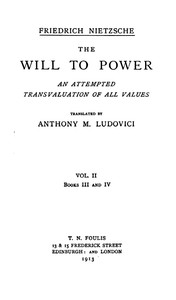The Will to Power: An Attempted Transvaluation of All Values. Book III and IV
"The Will to Power: An Attempted Transvaluation of All Values, Book III and IV" by Friedrich Nietzsche is a philosophical treatise written in the late 19th century. The work delves into Nietzsche's ideas regarding the concept of the "Will to Power," arguing for a radical re-evaluation of values across various realms, including science, art, and morality. Nietzsche's exploration challenges conventional understandings and seeks to assert the human will as a dominant force
in shaping knowledge and values. The opening of the volume introduces key themes and topics that Nietzsche will discuss in the subsequent sections. He begins by criticising traditional scientific methods, positing that science is as subjective as art, shaped by humanity's instinctual drive for survival and power. Nietzsche dismantles foundational concepts such as causality, the "ego," and the notion of objective truth, arguing that they are merely constructs imposed by human perspectives. He asserts that knowledge serves the Will to Power, emphasizing that our understanding and interpretations of the world are fundamentally influenced by our instincts and biological imperatives, thus laying the groundwork for a new philosophical framework. (This is an automatically generated summary.)
Read or download for free
| How to read | Url | Size | |||
|---|---|---|---|---|---|
| Read now! | https://www.gutenberg.org/ebooks/52915.html.images | 694 kB | |||
| EPUB3 (E-readers incl. Send-to-Kindle) | https://www.gutenberg.org/ebooks/52915.epub3.images | 337 kB | |||
| EPUB (older E-readers) | https://www.gutenberg.org/ebooks/52915.epub.images | 345 kB | |||
| EPUB (no images, older E-readers) | https://www.gutenberg.org/ebooks/52915.epub.noimages | 337 kB | |||
| Kindle | https://www.gutenberg.org/ebooks/52915.kf8.images | 544 kB | |||
| older Kindles | https://www.gutenberg.org/ebooks/52915.kindle.images | 475 kB | |||
| Plain Text UTF-8 | https://www.gutenberg.org/ebooks/52915.txt.utf-8 | 620 kB | |||
| Download HTML (zip) | https://www.gutenberg.org/cache/epub/52915/pg52915-h.zip | 297 kB | |||
| There may be more files related to this item. | |||||
Similar Books
About this eBook
| Author | Nietzsche, Friedrich Wilhelm, 1844-1900 |
|---|---|
| Editor | Levy, Oscar, 1867-1946 |
| Translator | Ludovici, Anthony M. (Anthony Mario), 1882-1971 |
| Title | The Will to Power: An Attempted Transvaluation of All Values. Book III and IV |
| Note | Wikipedia page about this book: https://en.wikipedia.org/wiki/The_Will_to_Power_(manuscript) |
| Credits |
Produced by Marc D'Hooghe Free Literature (back online soon in an extended version, alo linking to free sources for education worldwide ... MOOC's, educational materials,...) (Images generously made available by the Internet Archive.) |
| Reading Level | Reading ease score: 54.9 (10th to 12th grade). Somewhat difficult to read. |
| Language | English |
| LoC Class | B: Philosophy, Psychology, Religion |
| Subject | Values |
| Subject | Nihilism (Philosophy) |
| Subject | Power (Philosophy) |
| Category | Text |
| EBook-No. | 52915 |
| Release Date | Aug 28, 2016 |
| Copyright Status | Public domain in the USA. |
| Downloads | 1840 downloads in the last 30 days. |
| Project Gutenberg eBooks are always free! | |

